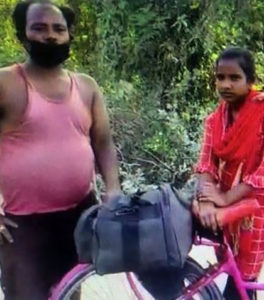Indian lockdown causes mass exodus from cities
India’s COVID-19 lockdown was declared with just four hours’ notice sparking a massive and often tragic exodus of migrant workers from the cities to their home villages.
The workers, the mainstay of the nation’s labour force, spilled out of big cities that have been shuttered due to the pandemic and returned to their villages – sparking fears that the virus could spread to the countryside.
 India’s 21-day lockdown has effectively kept 1.3 billion people at home for all but essential trips to places like markets or pharmacies.
India’s 21-day lockdown has effectively kept 1.3 billion people at home for all but essential trips to places like markets or pharmacies.
However, the world’s largest lockdown, called on March 25, became a humanitarian crisis for India’s improvised workforce.
They mostly live in squalid housing in congested urban ghettos. But with no daily earnings, no savings, and so no way to buy food, they headed home to their villages to survive.
Train services were suspended, taxis were unaffordable and the hundreds of buses brought to the outskirts of Delhi to ferry people home lacked enough seats.
That left walking. Official estimates say that between 500,000 and 600,000 migrants have walked to their villages from cities.
As the crisis worsened, authorities scrambled to arrange transport, shelter and food for them.
But, hundreds of people have died under the physical strain of the long hot days of walking, while others were killed in road accidents. Some have been robbed or beaten at state borders by police.
Amid the chaos and despair, there have been inspiring stories of improvisation and survival.
One such story is that of Jyoti Kumari who peddled more than a thousand kilometres to bring home her father, and out-of-work and injured migrant labourer.
She mounted a $30 bike bought with the last of the family’s savings and hit the road.
With her dad on the back of the bike, Jyoti peddled halfway across India – 1100 kilometres in all – to bring home her father Mohan Paswan, a rickshaw driver who had been injured and barely able to walk.
She rode from just outside New Delhi to her village of Sirhulli, in Bihar State, one of India’s poorest.
The BBC reported that the pair had little food on many days, living off the generosity of strangers. They slept in petrol stations.
Jyoto said that apart from one short lift on a truck, she pedalled 160 kilometre a day.
She has since been invited to join India’s national sports cycling program.
Some academics say there are tens of millions of people on the move, the biggest migration of humans India has seen since partition in 1947.
They says villages in India, despite government efforts at relief, are the real social safety net.












